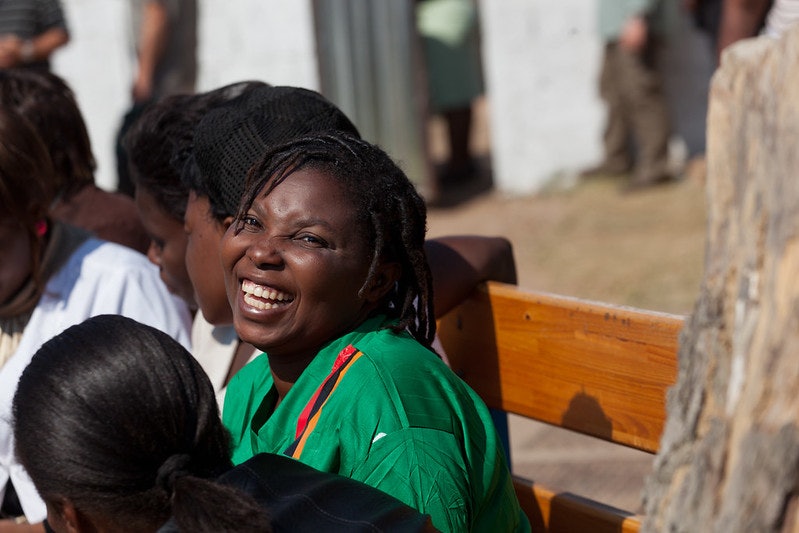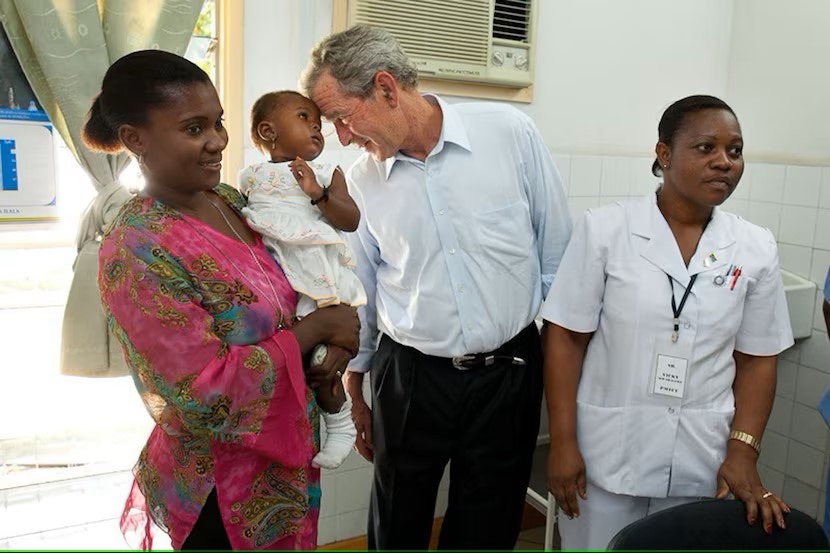In a letter to Congress and the Administration, a diverse alliance joins the Bush Institute in urging leaders to take bipartisan action to meaningfully protect the rights and agency of Afghan women and girls.
The undersigned group of organizations and individuals stand united in our support for women and girls in Afghanistan. The below letter, released to the Administration and Congressional leadership, highlights the imminent need for action to protect the rights, agency, and well-being of Afghan women and girls and to ensure a pathway to safety for the individuals and their families who have assisted the United States in Afghanistan. We look forward to working with policymakers and other stakeholders on these critical and timely issues.
Holly Kuzmich
Executive Director, George W. Bush Institute
——–
Since 2001, the United States has stood in solidarity with Afghan women and girls, decrying the human rights violations perpetrated by the Taliban and emphasizing that a country cannot truly be peaceful and prosperous if half of its population does not have equal access, rights, and protection.
Our drawdown of troops in Afghanistan must not abandon vulnerable populations. As recent intelligence reports reinforce, the safety and status of Afghan women and girls are already at serious risk should the Taliban regain national power. Their intentions are clear: The May 8 attack on a girls’ school in Kabul killed nearly 100 and injured more than 150 — mostly female students. They have threatened women in the workforce and the organizations that employ them. We cannot ignore what these actions signal about the Taliban’s intentions.
When women and girls hold equal and active roles in societies, communities not only thrive but countries are more secure and stable. Across Afghanistan, women and girls have made substantial gains in the areas of education, health and well-being, and economic inclusion. Today, millions of girls are attending school and women have greater access to healthcare, and are voting, running for office, starting businesses, and entering the workforce and higher education.
As research shows, peace and stability are not possible without the equitable inclusion of women across all levels of society. In 2016, the executive branch developed the National Action Plan on Women, Peace, and Security as a statement of American policy, and Congress recognized the essential role of women and women’s rights in peace by passing the Women, Peace, and Security Act of 2017. The status of Afghan women and girls is therefore just as important to the United States as it is to the Afghan government. Abandoning them to their fate is a glaring contradiction of our foundations and principles as a country.
Our actions in the days ahead will impact the status of Afghanistan for decades to come. They signal to the world the true value we place on freedom, equality, and constitutional order.
As the Biden Administration pivots its foreign policy toward geopolitical adversaries in Beijing, Moscow, and Tehran, a free and stable Afghanistan at the crossroads of Eurasia should remain a strategic priority. It is in our national security interests and our moral responsibility to support gender equality, human rights, and peaceful development in Afghanistan.
At this crucial time, sustainable support and strong accountability are needed now more than ever. To that end, we recommend that the Administration and Congress take bipartisan action to meaningfully protect the rights and agency of Afghan women and girls and to expedite a pathway to safety for the individuals and their families who have assisted the United States in Afghanistan. Equally important, we call on the White House and Congressional leaders to use their platforms to underscore why these policies matter to the peace, prosperity, and security of the United States. Our recommendations include:
- The Department of Defense and the State Department should maintain U.S. financial and institutional support of the Afghan national defense and security forces, including support for women’s participation and leadership in security sector institutions at all levels. This includes intelligence sharing with the Afghan government and other partners on atrocity prevention measures.
- The U.S. Agency for International Development, the State Department, and the U.S. International Development Finance Corporation should support and fund Afghanistan’s sustainable development in line with its policies and priorities, and in accordance with local organizations’ needs on the ground. This includes capacity building support and leadership development of local stakeholders.
- The U.S. Agency for International Development and the State Department should create budgetary targets dedicated to maintaining and advancing the status of women and girls in both urban and rural settings.
- The U.S. government, non-governmental organizations, private sector partners, and the international community should invest in Afghan women’s education, economic empowerment, and leadership development, with increased emphasis on innovation and STEM related fields. These programs should respond to the stated needs and distinct experiences of women and girls in urban and rural communities. The U.S.-Afghan Women’s Council is one example, but more are needed. They also must include enhancement and expansion of virtual education platforms. Long-term peace is not possible without sustainable solutions that allow Afghanistan to economically thrive.
- The State Department and the Special Representative for Afghanistan Reconciliation should help integrate Afghan women into the peace process and leadership roles, and make sure their equal rights are preserved. This includes supporting women’s grassroots efforts to build peace at the local level.
- The State Department and the Special Representative for Afghanistan Reconciliation should ensure democratic institutions, rule of law, and constitutional norms are upheld in peace talks and in any peace agreement between the Afghan government and the Taliban, including fundamental freedoms and rights of all Afghans.
- The White House in consultation with Congress should increase the annual refugee allocation for Asia to account for the increase in Afghans who will face immediate threats to their lives due to their work with the U.S. government, international NGOs, media outlets, and other institutions.
- The State Department and the Special Representative for Afghanistan Reconciliation should engage U.S. allies and regional stakeholders to bolster collaboration and regional support for Afghans, especially women and girls. The U.S. Embassy should continue to work with the UN Assistance Mission to Afghanistan to monitor developments on the ground and impact on civilians.
- Congress should increase the allocation for Afghan Special Immigrant Visas and the U.S. agencies involved in processing SIVs should reduce the administrative burden and expedite the process for Afghans who worked for the U.S. government.
As was painfully demonstrated by the 9/11 attacks, what happens around the world matters to us here at home. Regimes that espouse hateful, oppressive ideologies are compelled to lash out against the United States and its democratic allies because our liberal values are an existential threat. In the face of imminent and significant risk to women and girls in the region, we must seriously consider what we are willing to accept as a country.
Sincerely,
George W. Bush Institute
Afghan American Foundation
Aschiana Foundation
Association of Wartime Allies
Digital Citizen Fund
Human Rights First
Human Rights Foundation
Jesuit Refugee Service/USA
McCain Institute for International Leadership
National Immigration Forum
No One Left Behind
Our Secure Future: Women Make the Difference
Veterans for American Ideals
Women’s Regional Network: Afghanistan, Pakistan and India
Connie K. Duckworth, Founder and Former CEO, ARZU, Inc.*
Derek Mitchell, President, National Democratic Institute*
Irfan Nooruddin, South Asia Center, Atlantic Council; School of Foreign Service, Georgetown University*
Harris Samad, South Asia Center, Atlantic Council*
Daniel Twining, President, International Republican Institute*
Earl Anthony Wayne, Career Ambassador (retired)*
Matt Zeller, Association of Wartime Allies; Truman National Security Fellow; and American Security Project Adjunct Fellow*
*Signature is in an individual capacity and does not reflect organizational endorsement






























